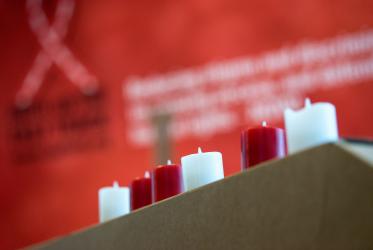Rev. Rahab Wanjiru Kariuki, an Anglican priest living with HIV in Kenya, strongly believes there’s a reason for an uptick in HIV infections among young people: “It is because we have kept silent.”
Kariuki refuses to be silent and refuses to remain passive. These are mantras not only for the way she lives but for the ways in which she ministers and cares for others.
She has seen that, even as worldwide rates of HIV are decreasing, in some communities, HIV infections are on the rise.
“There is an increase in death cases, and after you visit those people, you find in their houses, there are piles of (antiretroviral) drugs that have been left there,” says Kariuki. “This is because these people have been left alone, they are not socializing, they don’t have people to encourage them to take the drugs.”
For many years, Kariuki has been speaking out, setting an example, and urging others to speak out, too. She has served as part of two different President's Emergency Plan For AIDS Relief (PEPFAR) consultations, one in Kenya in 2016, the other in Uganda in 2017. The consultations were planned and facilitated by the World Council of Churches Ecumenical HIV and AIDS Initiatives and Advocacy (WCC-EHAIA) programme and financially sponsored through the PEPFAR-UNAIDS Faith Initiative. PEPFAR is a United States government initiative to address the global HIV/AIDS epidemic.
As a two-year PEPFAR-UNAIDS Faith Initiative enters its second phase, Kariuki plans to continue to be a key voice for the WCC-EHAIA as it develops and supports a sustainable response to HIV with the aim of ending HIV and AIDS by 2030.
Stamping out stigma
Kariuki has observed that, the higher the stigma surrounding HIV in a community, the higher the risk of new HIV infections.
Yet stigma has never ended, she says. “We’ve always had that problem of stigma and now it’s gaining its roots again,” she said. “When some religious leaders are asked questions from young people about the issue of HIV, they don’t have the answers. It’s like the information has been forgotten.”
Kariuki believes that religious leaders need to be reminded and encouraged to take responsibility for keeping good health in their society. “That is the will of God,” she says. “If all our efforts are put into it, there is nothing we can’t change.”
She and other faith leaders have been involved in training and workshops, organized by the WCC-EHAIA with local partners, that focus on the “SAVE” methodology, which stands for Safer practices, Access and availability of medication, Voluntary counseling and testing, and Empowering communities with skills. She also works through the International Network of Religious Leaders Living with or personally affected by HIV and AIDS, and participated in the WCC campaign “Leading By Example: Religious leaders and HIV Testing.”
Some people find it difficult to go get tested, she says. “Testing and counseling - there are some people who don’t go to the facilities and be tested because of stigma. So we need to look for ways and means where we can encourage religious leaders to be trained to do the practice of counseling and testing.”
Kariuki believes HIV can be defeated. In fact, she says, “there are great signs of hope. God has brought us ways of defeating HIV.”
She looks to the next generation with a great deal of optimism. “HIV is defeated in this way: people who are HIV positive, both of them can get children who are HIV negative. There is a generation coming that is HIV negative. HIV is preventable. But a lot of efforts need to be made so that we can prevent it.”
HIV is not curable but it is manageable, she adds. “People who are HIV positive like myself can live healthy lives if they adhere to medication. I have been HIV positive for over 20 years and I have never been hospitalized. I have been able to walk this life, holistic healing from God through science keeps me whole,” she says. “There is a great hope that HIV can be defeated and can be eliminated. Yes, it’s possible to eliminate HIV from the world.”
“Facing the storm of HIV, we can move together, be agents of change” (WCC press release of 6 September 2017)
Kenya: Voice of faith communities crucial in overcoming HIV (WCC press release of 14 October 2016)
WCC Ecumenical HIV and AIDS Initiatives and Advocacy (EHAIA)








